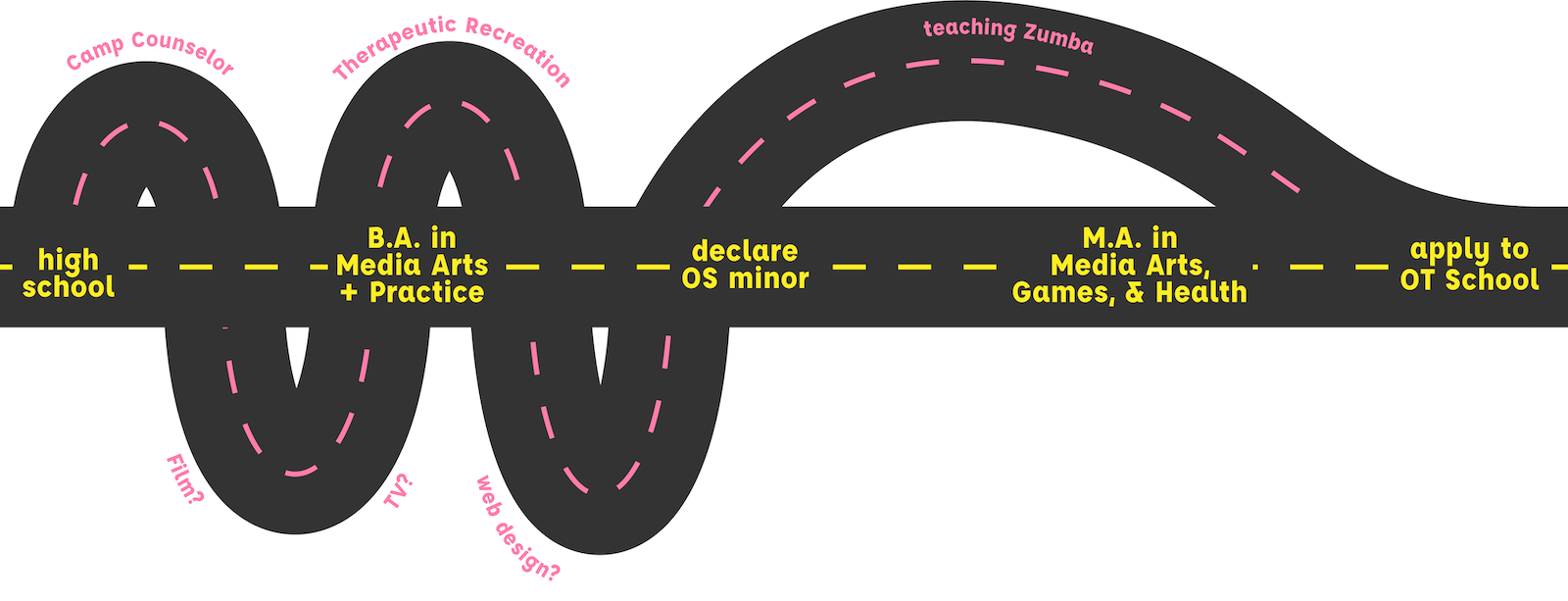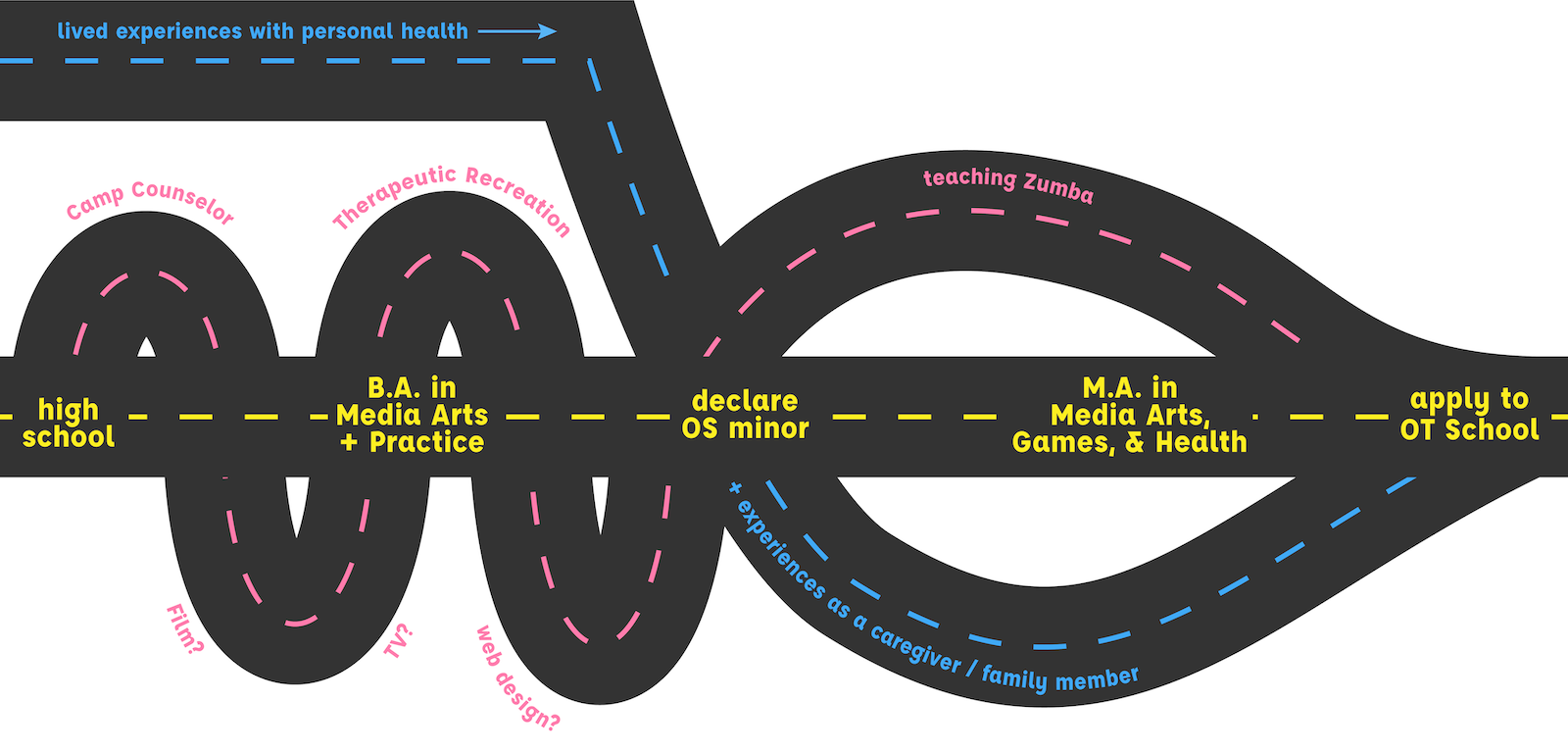Student Blog
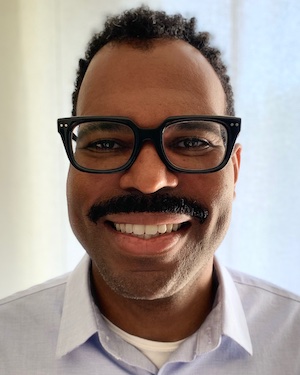
How to go to OT grad school after being out of school for a long time — Step 1 ⟩
September 21, 2021, by Guy
I’m changing careers to be an OT, help, what do I do?
So, after deciding you want to be an OT, you are daunted by the prospect of making it happen. You say to yourself, “Dude, I want to be an occupational therapist, but I have to go back to school — and it’s been sooo long.” Your brain continues with more self-doubt by saying, “Maybe it’s too late, I won’t be able to afford it? Besides, I was an art history major and studied some science, but that was in 2010 and I don’t remember any of it. I don’t have time to take all of these classes again and then graduate school!” Or you’re thinking, I’m ready, it’s time to make this happen. In either case, you just need some sort of road map of what it will take to go back to school. For me, I had no road map. I knew no occupational therapists who were recent grads, except for that one who became a regular at my bar (see my last blog) but that was after I started the process. So, I was left to internet searches and a few somewhat impersonal informational sessions at a few graduate schools (USC was not one of the ones that were impersonal — Thanks, Dr. Nxumalo and Dr. Bennett!).
If you are like I was (changing careers) and are trying to figure out how to go to OT grad school, I’ll be spending the next few blogs talking about my experience of going back to school. Hopefully reading these blogs will give you some helpful tips on what steps to take. However, please note these steps are what I did, and what worked for me. They are in no way the only way to get yourself to OT graduate school. Find what works for you.
Step 1: Taking pre-requisite classes so you can apply to graduate school
After making the decision that I wanted to be an OT and finding out about needing to go to graduate school to get a license, I went down the rabbit hole investigating what the requirements were to apply to graduate school. (Perhaps a similar search has caused you to land on this page.) Unfortunately, my liberal arts degree from the 90s was not going to be enough. One key thing I kept seeing on graduate school websites was there were a bunch of classes I needed to take, but because I had a liberal arts degree, I did not take most of those classes. Also, for the one or two classes, I did take, because I took them when I was in college more than 7 years ago, I would need to take them again . . . bummer. Most schools require the pre-requisite classes to be taken anywhere from 5 years to 10 years before attending graduate school. USCs requirement is you need to have taken your pre-requisites within 7 years of enrollment.
So, what classes do you need to take to apply to OT graduate school? Most OT grad schools but not require: Anatomy, Physiology, Abnormal Psychology, Developmental Psychology, Anthropology or Sociology, and some sort of medical terminology class and sometimes Statistics. Interestingly, one graduate school I thought about applying to, not USC, required all applicants to have taken Chemistry and Physics. Chemistry and Physics? No offense to chemists and physicists but no thank you!
Find the pre-requisites to apply to the USC Entry-Level OTD with links to possible courses.
Once I knew what pre-requisites most OT graduate schools required, I began to think about where I could take classes for the least amount of money. I just couldn’t afford to spend that much money on classes, and my wife was already a bit wary of this midlife career change and its impact on our finances and time. (How to make the change from a working adult to student and adjust your finances and time to attend graduate school will be coming up in Step 3 and 4.)
For me, the most logical way to complete my pre-requisites was going to community college. (Big shout out to LaGuardia Community College and LACC!) It was affordable, I was also able to complete all the prerequisites for approx. $50 a credit, and it offered me the most flexibility around scheduling so that I could continue to work full-time. I was able to get online classes, and weekend and evening classes. Also, because many community colleges are on a quarter system, I was able to take more classes in a shorter amount of time. In addition, it was a great way to slowly get back into going to school and not feel totally overwhelmed. For me, I hadn’t been to school in a very long time . . . scary. I was able to start slowly by taking one class per semester. I was able to complete all of my pre-requisites in less than two years. However, in the midst of that, I did eventually start working a part-time job which freed up more time to double up on classes and accelerate completion . . . more on that in my next few blogs.
One thing to remember if you decide to go to community college is to complete your pre-requisites. Make sure to register for Anatomy and Physiology classes early. They often fill up very quickly because most if not all health profession graduate schools require applicants to take these classes. They are very much in demand and can be closed on the first day of registration.
You might be saying, as I did, “Why do I have to take all of these classes. It seems like so much time and money! I’ve already got a college degree, isn’t that enough?”
Well kind of but after being in graduate school for a little more than a year now, I understand the reason and value of taking all of these pre-requisite courses. Yes, my college degree and your college degree probably gave you important skills needed to handle the academic rigor of graduate school, however, these pre-requisite courses provided me with an important base of knowledge specific to occupational therapy, and I find that this knowledge comes up almost every day I’m in graduate school. In fact, all of the classes that I have taken in graduate school have at some point referred back to things I learned in each of those pre-requisite courses. Just yesterday something from my developmental psych class came up . . . Albert Bandura and social learning theory anyone? . . . and that DCML pathway I learned about in my physiology class comes up all of the time, who knew how important that would be to so much of what OTs do on a daily basis!
So, hop on it, and get ‘em done!
Good luck with your pre-requisites and welcome back to school if you just started taking your pre-requisites or are currently taking them.
⋯
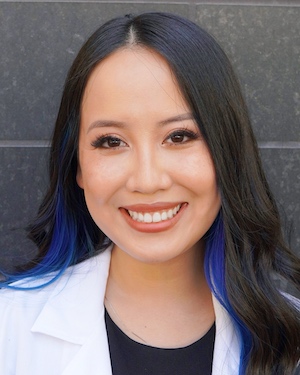
Dancing In the Rain ⟩
September 15, 2021, by Teresa
In the Vietnamese language, there is a phrase to offer your condolences to someone when a loved one passes — “chia buồn” — which roughly translates to, “I share in your sadness.” I’ve always found it poignant and have yet to find a phrase in English which can succinctly convey the same sentiment; that if the weight feels too much for one person to bear, please allow me to help you carry it.
This past summer, my grandpa passed away, peacefully and surrounded by loved ones after many years of suffering many strokes. Recounting his life, I realized I had known him as ill for more years of my life than I had not. Growing up, most of my interactions with him existed within the confines of a skilled nursing facility. This past summer, I was also completing my first Level II fieldwork experience in a skilled nursing facility.
During his celebration of life, my family went around the room sharing stories about grandpa. After my dad retired, he took upon the role as an informal caregiver to my grandpa and shared how much grandpa hated my dad’s visits to the nursing facility because he knew that meant it was time for a bath. My mind went, “OT!” but everyone took the light-hearted story for what it was and laughed, including myself. A few weeks later during fieldwork, I was notified that a family member wanted my patient to work on bathing during OT that day.
My patient did not want to work on bathing during OT that day.
They were protesting against the task, bargaining with me, and apologizing for how their disability was inconveniencing my work. I thought of my grandpa and how I would want a therapist to approach the situation if it was him. In places like skilled nursing facilities, there is so much loss of control. People have little to no control in their routine, what and when to eat, what medications they take, and how quickly (or slowly) their body is changing. So when a bright-eyed young OT student comes knocking on their door, asking if they want to take a bath, they say “no” — and you let them, because it returns just a tiny sliver of control to their life.
On several occasions, concerned family members entered the rehab gym with questions about their loved one’s progress during therapy. While others avoided eye contact so as not to get flagged down with questions, I’d approach them and provide updates as best I could. Afterwards, therapists would say to me, “You’re a student — you didn’t have to do that” to which I would reply, “I wanted to.” Just as much as I want to share in victories with patients and their families, I want to share in their sadness with them as well because it’s how I would want my own loved ones to be treated by providers.
Dr. Rafeedie often says how “occupational therapists teach people how to dance” but I’d like to add a stipulation — that sometimes, we teach people how to dance in the rain. That sometimes, in even the bleakest of places, you can teach people how to flip their outlook on life, flip the way they move and feel, and flip the way the system works because as occupational therapists, you’re well-equipped to. OTs possess the impeccable ability to take an unfortunate situation and turn it into something wonderful.
I lost my grandpa this summer yet somehow, I still saw him a lot. I saw him through my patients and the cheesy jokes they’d crack during our sessions. When they encouraged me to work hard in school and finish strong, I heard my grandpa cheering me on. On their families’ faces, I saw my own family’s faces — the looks of desperation, of encouragement, of sorrow, of hopefulness. To whoever is reading this with a heavy heart: I share in your sadness with you, whatever it may be. The rain is clearing and the sunshine is coming, I can feel it. Let’s dance.
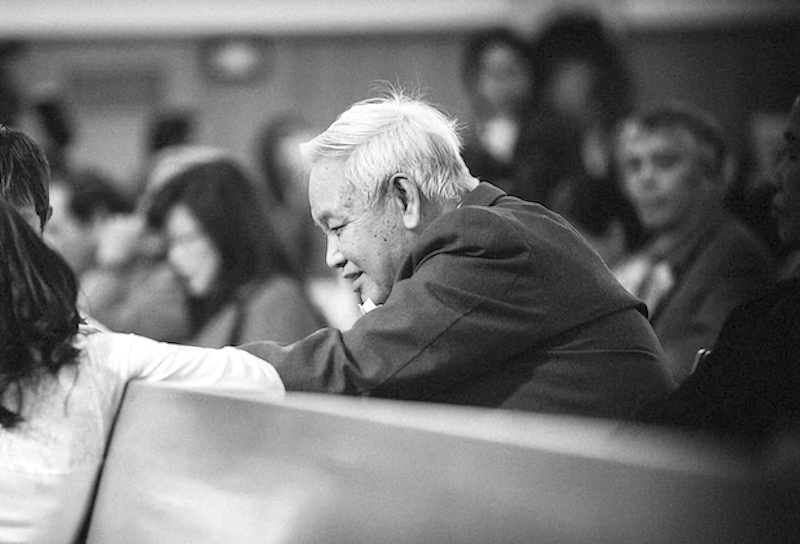
In loving memory of Thomas Dương Đức Thanh
⋯
Externship project — The experience of spiritual participation among people with intellectual disabilities in an evangelical church in Hong Kong ⟩
September 15, 2021, by Global Initiatives Team
Diversity Externships International
By Rebecca Ka Ki Tam
Post-Professional Master’s student
This externship project was inspired by the concept of occupational justice. I worked as a pediatric occupational therapist in preschool settings in Hong Kong before studying at USC. During those days, I had little knowledge about occupational justice. My studies at USC have expanded my understanding of occupational justice and greatly inspired my belief that occupational therapists can advocate for everyone’s right to participate in everyday occupations regardless of age, ability, gender, social class, or other differences (American Occupational Therapy Association, 2020; Nilsson & Townsend, 2010, p. 58). This concept has allowed me to reflect on my experience volunteering in a church in Hong Kong that pioneered spiritual participation among people with intellectual disabilities (ID). I experienced the joy among people with intellectual disabilities in their Sunday services. I wondered, however, whether spirituality is vital to their well-being. This population is one of the most controversial populations to serve in churches since many people believe that individuals with ID cannot fully understand the concept of faith. Thus, I became curious to know more about spirituality in this population — what is their experience in this occupation? How important is faith among people with ID? As revealed in my full article, I started this externship project to explore spiritual participation among people with intellectual disabilities. I conducted interviews in a church that pioneered spiritual participation among people with intellectual disabilities in Hong Kong. I interviewed a participant with severe ID, the participant’s caregiver, a volunteer, and two pastors. I also interviewed Professor Sarah Shea, who is involved in research relating to practical theology and theologies of disabilities and who ministered to marginalized populations at Hong Kong Baptist Theological Seminary.
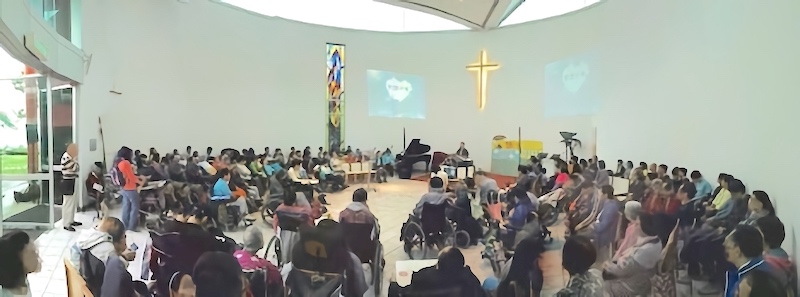
Participants were participating a Sunday Service in an evangelical church that pioneered the facilitation of spiritual participation among people with intellectual disabilities in Hong Kong
One memorable experience during this project was my interview with Anna (pseudonym), who has a severe ID. During the interview, she prayed for me, sang me a gospel song, and joyfully asked me to accompany her to church. Anna revealed how much she loves church life. I was very touched by her warm welcome and explicit love. Her caregiver shared with me that spiritual activities were unique in that they have helped Anna understand more about life and death, and overcome loneliness.
Anna initially was not comfortable talking to me during the interview. At first, she frequently walked away and ignored my questions. I then tried to talk in simple sentences and treated her as a friend. She gradually became more relaxed, sat down, and chatted with me. It reminded me of a pastor’s sharing that it is always important to be “present” — “Take your time, no rush. Be there with them, despite their circumstances, and treat them genuinely as true friends.”
In this project, I further reflected on how the arbitrary binary of “typical” or “atypical” classifications has inevitably become a barrier to genuine communication. Despite differences, we can always treat each other as true friends, learn from each other, and accept support and help from each other. I used to have a misconception that people with different intelligence might have different needs. Thus, it might be suitable to segregate people into various groups according to their needs. However, I realized this misconception was a barrier that had obstructed my genuine interaction and friendship with people diagnosed with intellectual disability. There should not be hierarchies in interaction, but we should celebrate our diversity. In an interview, a pastor shared that occupational justice probably does not merely focus on enabling people to participate in a particular occupation but also emphasizes the meaningful interaction among different people within that context. I envision that the concept of occupational justice will be more widespread someday, and I hope this article will motivate the public to advocate for occupational justice among people with intellectual disabilities.
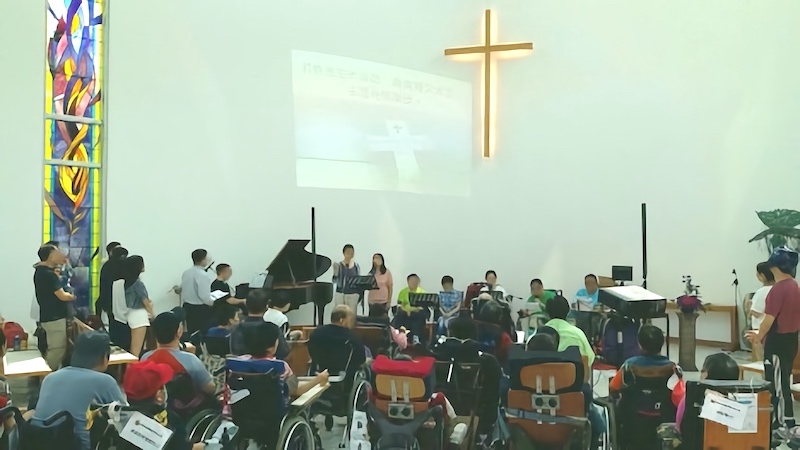
Participants, no matter with disabilities or not, were leading worship
References
American Occupational Therapy Association. (2020). Occupational therapy practice framework: Domain and process (4th ed.). American Journal of Occupational Therapy, 68(Suppl. 1). S1-S48.
Nilsson, I., & Townsend, E. (2010). Occupational justice — Bridging theory and practice. Scandinavian Journal of Occupational Therapy, 17, 57–63. https://doi.org/10.3109/11038120903287182
Tam, R. K. K. (2021, July 15). The experience of spiritual participation among people with intellectual disabilities in an evangelical church in Hong Kong
⋯
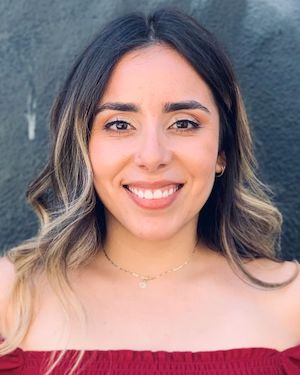
Dear Zoom, it wasn’t you ⟩
September 14, 2021, by Silvia
I’m just going to say it — I miss Zoom University.
Zoom University and I had a toxic relationship and although it wasn’t my first, it certainly is the only one I miss. Sometimes you really “don’t know what you have till it’s gone.” Don’t get me wrong; I love being on campus, seeing all my beautiful friends, and making real-life connections with my professors, pero like*. . . it’s hard out here.
Before making the transition back to in-person classes, after over a year of Zoom, I never truly realized or acknowledged how much work it takes to be an occupational being, aka a student. Let’s just consider some of the things that we didn’t have to do when Zoom was part of our lives (or at least my life):
- Get ready in the morning (if you still did this, I am proud of you and I admire you)
- Prep lunch
- Pack bag(s)
- Leave the house
- Drive to campus
- Find parking
- Walk to class
- Sit in class
- Actually pay attention in class (R.I.P mute and camera functions)
- Socialize
I’m sorry, but the fact that I can’t get up and walk to my fridge for a quick snack or mute myself/turn my camera off and lay down on my bed for a second is rude. Also, do you know how intense my phobia of getting stuck in LA traffic on a school morning is? Ok never-mind the phobia, have you seen those gas prices? Seriously though, transitioning back to in-person classes has been quite an adjustment that I wasn’t fully prepared for.
As much as I hated being confined to Zoom at home, I had a greater sense of control over my entire school experience and I loved that about our relationship. I didn’t have to worry about traffic, whether or not I would find a parking spot, or being late for that matter. I could monitor the sound level, air temperature, light intensity, number of guests—basically everything that I have absolutely no control over in the underground lecture hall, G 37. G 37 induces sensory overload in my body and exhausts me; it makes me reminisce the good times with Zoom.
I feel guilty for hating Zoom so much when all it did was love me and be there for me through the hard times, aka the pandemic. Yes, it gave me migraines and worsened my vision, but it also let me sleep in, eat during class, lay down between lectures, and spend my money on things other than gas. If I am being honest, it wasn’t Zoom, it was me. I was so upset and stuck on the idea of being “robbed” from my graduate school experience that I didn’t value or appreciate all the good things Zoom had to offer. I thought I was ready to move on—to be 100% back in-person and on campus—but what the heart wants is not always what the body wants or needs. While my heart is happy to finally see and meet my cohort and class in real life instead of a square on a computer screen, my body is tired and needs time to adjust.
I know I am not the only one feeling this way, and I just want you to know that you have permission to miss Zoom too. Listen to your body, allow it to rest and recharge as it adjusts to yet another change.
*Common Spanglish phrase meaning “but like”
⋯
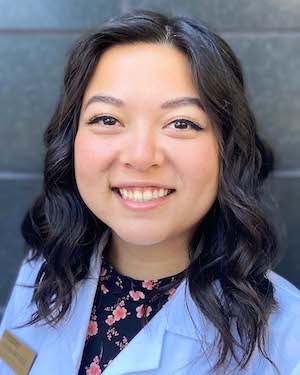
All roads lead to OT ⟩
September 8, 2021, by Alyssa
The first time I heard the phrase “occupational therapy” I was standing in the freshman dorm room of my future best friend (+ former Chan student ambassador) Noelle; I had just moved in down the hall. She told me about the BS-MA program, and I thought, that’s cool and then did not think about OT again for 2 years.
—
That’s the simple start to my messy story answering the question “Why OT?” I think of it as driving down 3 roads at the same time. To help navigate, I’ve included some illustrations.
Road 1: Academic Life
While media studies and OT may seem unrelated, this road was the most direct.
Freshly graduated from a media-focused vocational high school, I was excited to don my new hat as a student at the USC School of Cinematic Arts. Several of the classes for my Media Arts + Practice major focused on media ethics and the impact of technology on daily life, which built my interest in the use of media outside of the entertainment industry. I had a particular interest in media for healthcare and bounced around between a few different minors to explore this intersection. When I ultimately declared my occupational science (OS) minor, I knew I had found the perfect way to combine my interests in both arts and healthcare. For my undergraduate senior thesis, I prototyped an assistive device designed to help parents practice self regulation strategies with their children.
In the year following, I completed my OT school prerequisites and applications while pursuing my MA in Media Arts, Games, and Health. A natural transition between media and OT studies, I sharpened my research skills and broadened my understanding of technology use/gaming as an occupation.
On this road, I ignited my interests in interdisciplinary research and excitement for OT studies.
Road 2: Work Life
I’ve always been a bit of a workaholic. So, on top of all that school, I spent my extracurricular time trying on a bunch of careers.
I spent my freshman and sophomore years dream hopping from film editor to TV producer to website coder to themed entertainment designer. I worked intense hours at USC’s student TV station and explored my interests further with internships at a news station and a science museum. These were all incredibly interesting experiences, but none of them felt right for me.
In the off season, for 5 summers, I worked as a camp counselor at my local parks system. In my 6th summer, I transitioned into the therapeutic recreation division, providing one-to-one support for children with disabilities on general day camps. These were the first jobs that showed me that going to work doesn’t have to feel like work. The only other job I felt this way about was teaching Zumba at the USC gym.
On this road, I realized the commonality between jobs I truly enjoyed was forming connections and making a direct, meaningful impact on others.
Road 3: Personal Life
In the same semester that I declared my OS minor, I was supporting a loved one through rehabilitation following emergent open heart surgery. As I stayed involved in their recovery, I noted how their re-engagement in meaningful occupations, such as returning to work or playing basketball again, were what gave them and our family a sense of hope among the hardships. It was just like what I learned in my OS minor courses — that holistic healthcare is about more than survival.
I have also had exposure to the patient perspective through my experiences with chronic illness. After years of doctor’s appointments, I’ve seen the kind of provider I want to be — one that emphasizes the practices of listening, patience, empathy, and advocacy.
On this road, I saw the power of meaningful occupations and found my passion for providing individualized care.
—
If I could go back in time to my first conversation with Noelle and tell myself to look into/pursue OT right away, I wouldn’t. The non-traditional path was the way for me.
That being said, it feels nice to keep my eyes on one road now. Can’t wait to see where it goes.
⋯







